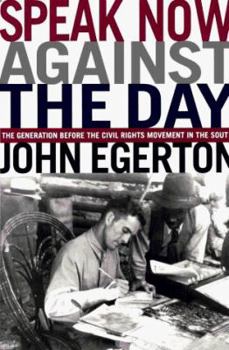Speak Now Against the Day: The Generation Before the Civil Rights Movement in the South
(Part of the Chapel Hill Books Series)
Select Format
Select Condition 
Book Overview
The compelling story of the earliest calls for desegregation and racial justice in the South. "Make room on your library shelf . . . for John Egerton's magnificent Speak Now Against the Day. His book... This description may be from another edition of this product.
Format:Hardcover
Language:English
ISBN:0679408088
ISBN13:9780679408086
Release Date:October 1994
Publisher:Alfred A. Knopf
Length:704 Pages
Weight:2.90 lbs.
Dimensions:2.4" x 6.9" x 9.7"
Customer Reviews
4 ratings
Impossible to Put Down
Published by Thriftbooks.com User , 18 years ago
The precedent for any book about the history of the modern Civil Rights movement
A great book
Published by Thriftbooks.com User , 21 years ago
I found this a stupendous book, and while at times I felt I was treading well-known ground, and at times the account of the efforts of groups battling to end segregation was overly extensive in discussing individuals of little present fame, the book reads pleasantly and effortlessly, with the decision in Brown v. Board of Education as the good finale. I would recommend that after reading this book one should read Simple Justice, by Richard Kluger, which tells the story of Brown v. Board of Education itself superlatively. The title of this book is from a statement by William Faulkner heavy with prophetic insight: "We speak now against the day when our Southern people who will resist to the last these inevitable changes in social relations, will, when they have been forced to accept what they at one time might have accepted with dignity and goodwill, will say: 'Why didn't someone tell us this before? Tell us this in time?'"
A Turning Point in the Civil Rights Struggle
Published by Thriftbooks.com User , 22 years ago
A recent work by MacPherson on the battle of Antietam attempts to locate the turning point in the Civil War. Reading this work one wonders if the whole history of abolition is not a series of endless turning points against eternal delays. This very cogent work by someone acquainted with the facts is an invaluable expose of how politics actually works in that scarface Uncle Sam's 'democracy' of equals. Giving the history and gritty details of post-Reconstruction politics dominated by the Bourbon elites, it is essential reading for anyone attempting to decipher the legacy of the Civil Rights movement this period prefigures, and starts to anticipate. Histories of Roosevelt's presidency don't always make clear what was going on, and the obstacles he faced. Nor do we quite assess the effect of the Second World War on the economic context behind Jim Crow in its ad infinitum history of domination, political manipulation, and class and racial struggle. We can see the great tide turning in the thirties and forties, as the struggle begins just to recoup the ground lost in the 1870's and after, Lyndon Johnson's voting rights bill a resurrection of the same failed bill of the Redemption era. Out of many issues in this very useful book is a reminder of how Lyndon Johnson, extremely adept in this Lost Cause dominion, was deftly able at the right moment to get the job done, if it has been done. With this history, keep your eyes peeled. We could be far short of 'done'.
Vivid, enlightening review of a neglected period of history
Published by Thriftbooks.com User , 27 years ago
The author reviews the period of American history between 1930 and 1954 with the central goal of illuminating the foundations of our civil rights movement. The depth, detail and accessability of this information is without peer; any reader will have their insight into American racism expanded, as well as their knowledge of the many people who have opposed racism and bigotry. One important lesson is demonstrated over and over again: We do not need to be perfect to stand up for what is right. Again and again, the author tells us stories about people who were clearly imperfect, narrow-minded, or flawed; yet these same people were able to change their communities for the better. The author clearly shows that the period from 1945 to 1954 was a time of possibility, of potential. Americans had an opportunity then to improve race relations in our nation, yet they turned away from that choice. Today, with headlines about OJ blaring, with so many people deserting the cities, we would do well to heed the lesssons offered in this book.





